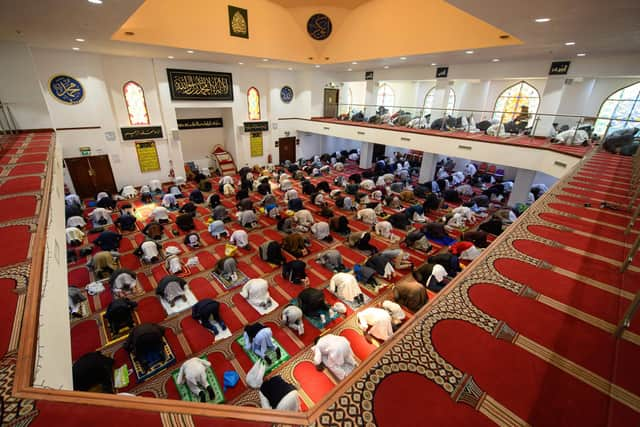Ramadan 2022 timetable Glasgow: dates, prayer times, what time is Iftar and Suhur - and when is Eid?
and live on Freeview channel 276
The holy month of Ramadan is here, with Muslims across the world beginning to fast and honour the festival.
The fasting times get longer and change each day due to the daylight hours lengthening, meaning the sun rises earlier and sets later.
Advertisement
Hide AdAdvertisement
Hide AdThe fasting times also change depending on where you are in the world, and even differ from place to place in the UK.
Here are the key times and dates for worshippers in Glasgow throughout the holy month of Ramadan.
What is Ramadan?


Ramadan is the ninth month of the Islamic calendar. The month is said to mark the time the Quran was revealed to Phophet Muhammad by God with a month-long fast.
During Ramadan, Muslims are required to abstain from food and drink, including water during daylight hours for a period of 30 days. It is a time of reflection and celebration of their faith.
Advertisement
Hide AdAdvertisement
Hide AdFasting is one of the five pillars of Islam, which are the fundamental rules that all Muslims must follow.
As well as fasting at Ramadan there is Shahadah (declaration of faith), Salat (prayer), Zakat (charity) and the Hajj pilgrimage.
At the end of Ramadan there is the three day festival of Eid al-Fitr. This is celebrated and fast is broken.
When is Ramadan?
In 2022, Ramadan is expected to start on Saturday 2 April. However, if the moon isn’t sighted it will come a day later.
Advertisement
Hide AdAdvertisement
Hide AdWhen is Eid al-Fitr?
In Arabric, the phrase Eid al-Fitr translates to ‘feast of breaking the fast’. It is a religious holiday that marks the end of Ramandan.
The festival marks the beginning of the tenth month in the Islamic calendar.
Eid al-Fitr can last between one and three days. Primarily, it is celebrated for one day in the UK.
After Eid some Muslims decide to fast for the six days that follow. This comes from the Islamic belief that a good deed in Islam is rewarded 10 times.
Advertisement
Hide AdAdvertisement
Hide AdTherefore, fasting for the 30 days of Ramadan, and six days of Shawwal will create a year’s worth of good fortune.
With Ramanda ending on 1 May, Eid al-Fitr will begin Sunday, 2 May this year.
What time is Fajr and Maghrib/Iftar?
The timings of daily prayers for Ramadan vary from place to place, depending when you are.
This is due to the fact that the sunrise and sunset times differ depending on where you are in the UK.
Advertisement
Hide AdAdvertisement
Hide AdThe changing sunrise and sunset times mean that for Glasgow the time for Fajr gets earlier as we draw closer to the summer, and Maghrib/Iftar gets laters.
- 2 April: Fajr - 5:10am, Maghrib/Iftar - 8pm
- 3 April: Fajr - 5:08am, Maghrib/Iftar - 8:02pm
- 4 April: Fajr - 5:05am, Maghrib/Iftar - 8:04pm
- 5 April: Fajr - 5:03am, Maghrib/Iftar - 8:06pm
- 6 April: Fajr - 5am, Maghrib/Iftar - 8:08pm
- 7 April: Fajr - 4:57am, Maghrib/Iftar - 8:10pm
- 8 April: Fajr - 4:55am, Maghrib/Iftar - 8:12pm
- 9 April: Fajr - 4:52am, Maghrib/Iftar - 8:14pm
- 10 April: Fajr - 4:50am, Maghrib/Iftar - 8:16pm
- 11 April: Fajr - 4:47am, Maghrib/Iftar - 8:18pm
- 12 April: Fajr - 4:45am, Maghrib/Iftar - 8:20pm
- 13 April: Fajr - 4:42am, Maghrib/Iftar - 8:22pm
- 14 April: Fajr - 4:40am, Maghrib/Iftar - 8:24pm
- 15 April: Fajr - 4:37am, Maghrib/Iftar - 8:26pm
- 16 April: Fajr - 4:34am, Maghrib/Iftar - 8:28pm
- 17 April: Fajr - 4:32am, Maghrib/Iftar - 8:30pm
- 18 April: Fajr - 4:29am, Maghrib/Iftar - 8:32pm
- 19 April: Fajr - 4:26am, Maghrib/Iftar - 8:34pm
- 20 April: Fajr - 4:24am, Maghrib/Iftar - 8:36pm
- 21 April: Fajr - 4:20am, Maghrib/Iftar - 8:38pm
- 22 April: Fajr - 4:18am, Maghrib/Iftar - 8:40pm
- 23 April: Fajr - 4:15am, Maghrib/Iftar - 8:42pm
- 24 April: Fajr - 4:12am, Maghrib/Iftar - 8:44pm
- 25 April: Fajr - 4:10am, Maghrib/Iftar - 8:46pm
- 26 April: Fajr - 4:07am, Maghrib/Iftar - 8:48pm
- 27 April: Fajr - 4:04am, Maghrib/Iftar - 8:50pm
- 28 April: Fajr - 4:02am, Maghrib/Iftar - 8:53pm
- 29 April: Fajr - 03:59am, Maghrib/Iftar - 8:55pm
- 30 April: Fajr - 3:56am, Maghrib/Iftar - 8:57pm
- 1 May: Fajr - 3:53am, Maghrib/Iftar - 8:59pm
When are Suhur and Iftar take place?


Suhur is the meal that Muslims will sit down to eat before sunrise each day. Sunrise signifies the start of their fasting period during Ramadan.
The meal is eaten before sunrise and followed by the Fajr prayer at sunrise.
Iftar is the meal that is eaten in the evening after the sun has set for the day. This sunset marks the end of the fasting period for the day, and is followed by the Maghrib prayer.
Comment Guidelines
National World encourages reader discussion on our stories. User feedback, insights and back-and-forth exchanges add a rich layer of context to reporting. Please review our Community Guidelines before commenting.
